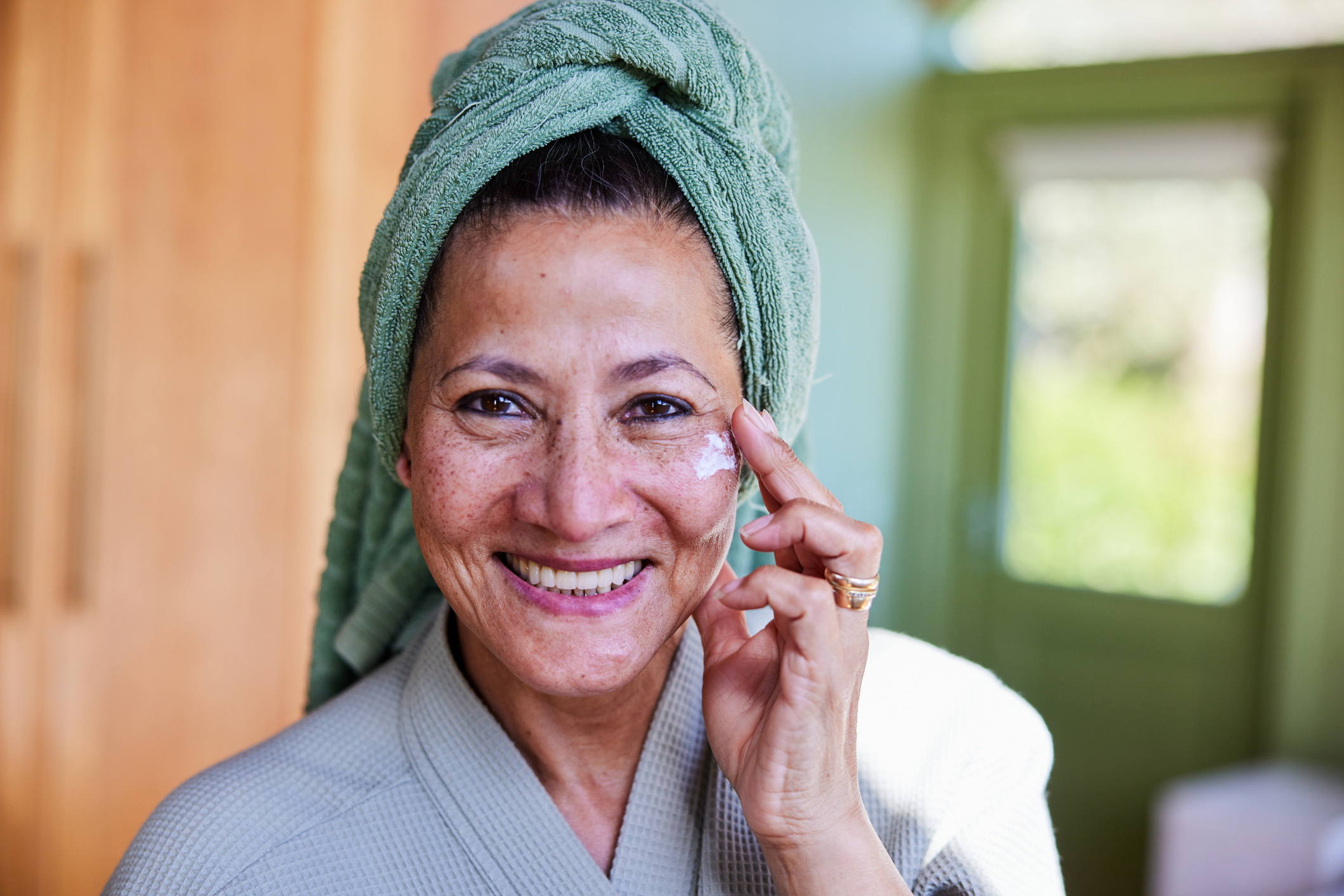Get Easy Health Digest™ in your inbox and don’t miss a thing when you subscribe today. Plus, get the free bonus report, Mother Nature’s Tips, Tricks and Remedies for Cholesterol, Blood Pressure & Blood Sugar as my way of saying welcome to the community!
4 ways to boost collagen and love the skin you’re in

Collagen is a protein central to the elasticity and regeneration of our skin. It’s responsible for keeping skin firm, plump, smooth and young-looking. After the age of 20, our natural production of collagen reduces by one percent each year.
That’s why we typically begin to notice the earliest signs of aging in our skin — a few fine lines here and there — as we approach our mid 30s. By the time we reach 40 our skin is no longer producing collagen and begins to lose elasticity. As we approach 50 we begin to see the more profound effects of aging, like deeper wrinkles, sagging and skin that is much thinner and prone to damage and infection.
So, then, it’s no wonder that a variety of moisturizers, serums and thick, goopy night repair creams containing collagen line the drugstore shelves. But are they effective? Many dermatologists question the effectiveness of combatting the visible signs of aging by applying collagen directly to your skin. There is some debate about how well the collagen in these products is absorbed into the skin, if it is even usable at the molecular level, and if the body’s immune system may even see it as an invader and attack it.
All the more reason to boost your body’s own collagen stores. Fortunately there are quite a few ways to help your body naturally produce more collagen and improve the look and health of your skin.
#1 Beauty begins on the inside
The old saying “beauty begins on the inside” — like most old sayings — is grounded in some truths.
A body that takes in clean healthy food as part of a well-balanced nutritionally sound diet tends to be healthy on the inside — and that often translates to beautiful healthy skin. But eating a perfectly healthy diet is not always easy to do and there’s no guarantee that your skin won’t sag or become wrinkled.
However, there are certain foods that are reported to stimulate collagen production and incorporating some of them into your diet could be pretty simple. Besides, the payoff — firmer younger-looking skin — could be all the motivation you need!
Research supports the collagen-boosting benefits of some foods, but I decided to visit several dermatology and aesthetician sites to see what they recommended. Over and over again I saw the same foods listed as collagen boosters, starting with…
- Red vegetables—like tomatoes, peppers and beets contain the antioxidant lycopene which acts as a natural sunblock and increases collagen production.
- Dark leafy green vegetables—like kale and spinach, are rich in vitamin C, a powerful antioxidant that protects collagen.
- Orange vegetables—like carrots and sweet potatoes are rich in vitamin A, which restores and regenerates damaged collagen.
- Citrus fruits—are high in amino acids lysine and proline which convert to collagen.
- Garlic—is sulfur food and is necessary for the production of collagen. It also contains lipoic acid and taurine that help rebuild collagen.
- White tea—has been found to protect skin proteins, specifically collagen.
I’ve got one more nutritional recommendation for you, and even if you’re the pickiest eater or busiest person on the planet, this addition to your diet is so easy you’ll have no excuse. And keep reminding yourself of the payout—youthful skin…
#2 Collagen hydrolysate
Let’s start with the big guns: In one recent large study, women who took 50ml of a specific brand of hydrolyzed collagen peptide once a day for 12 weeks experienced a significant increase in collagen density and skin firmness. After 60 days they experienced a noticeable reduction in skin dryness and wrinkle depth. Additionally, production levels of procollagen (the body’s precursor to collagen) in these women skyrocketed.
Hydrolyzed collagen peptides are readily available as collagen hydrolysate — a form of gelatin. Gelatin is collagen protein derived mainly from the bones of animals. It’s one of the reasons there has been a huge renewal in interest for bone broth.
But if you’re not into boiling bones in your kitchen, you could try collagen hydrolysate in a powdered form that easily dissolves in cold water or other drinks like juice or smoothies. It’s also available in supplement form that may be powder or liquid—as was the case with the brand used in the study I mentioned above. (You can click the study link to get the brand name if you’re interested.)
Hydrolyzed collagen peptides don’t gel like gelatin therefore it’s easier to digest. For this reason it’s believed to be a very bioavailable form of collagen that your body can quickly absorb and put to use right away.
It also provides glycine, proline and lysine — amino acids required by the body to build healthy tissue. These important building blocks for connective tissue are found in most other protein sources but in much lower amounts. You may not know it, but collagen is just as important to your joints, muscles and bones as it is to your skin!
There are brands of collagen hydrosolate you can find online that verify their products come from grass fed and humanely raised cows, and that would be my only recommendation.
#3 The red light that will stop wrinkles in their tracks
Lower-level laser light therapy that produces red and near infrared light has been found to stimulate, heal and restore skin, and the studies that back up these claims go as far back as 1987. Red light therapy is able to penetrate deep enough that is stimulates the production of collagen and elastin — exactly what we need for plumper, firmer skin — without causing any visible damage at the skin surface level. No healing. No downtime.
Red light therapy is available at clinics and salons, and even at some tanning salons (though if you jump into a tanning bed after red light therapy you’re undoing any benefit your skin would have received!).
There are also plenty of choices for at-home red light therapy devices ranging in prices anywhere from $30 on up. Just do an internet search for “red light therapy at home devices.”
#4 Exfoliate to activate
I knew exfoliating was good for my skin, but was a skeptic about just how much of an impact it can have until a recent spa visit. For mother’s day this year, my daughter, who works at an upscale salon, gave me a gift card for a facial. And the difference in my skin was like night and day.
On my way home from the appointment, I could not stop touching my face. I could not recall a time when my skin felt so new and smooth. I became a believer and have been a daily exfoliater since.
Exfoliation helps kick start collagen production because creating mild irritation to your skin triggers a healing response. Part of that response is fibroblast cells that begin to synthesize collagen fibers. Exfoliation also increases cell turnover in your skin, which slows with aging. If you help remove the dead cells, you make it easier for newer cells to come to the surface.
Exfoliation can be as easy as using a washcloth with a little more pressure along with your preferred cleanser. There are also cleansing brush devices, cleansing pads, and my preference which is exfoliating scrub cleansers.
If you choose an exfoliating scrub cleanser steer clear of the ones that contain plastic microbeads. The plastic waste caused by microbeads are not filtered out during sewage treatment and are damaging water ecosystems, including marine life.
Instead, go with something that uses natural materials. Some natural exfoliators used in products includes sodium barcarbonate, corn meal, oatmeal, sugar and ground nut shells or fruit pits. It also helps to look for a scrub cleanser that contains salicylic acid (which occurs naturally in plants) to expedite cell turnover.
Some may say our desire for youthful skin is a self-centered search for a Holy Grail. But if you think about it, we don’t think the same way about keeping our heart or liver healthy. Your skin is your body’s largest organ. Keeping it healthy keeps you healthy. So why not be as comfortable in the skin you’re in as long as you can?
Editor’s note: Are you feeling unusually tired? You may think this is normal aging, but the problem could be your master hormone. When it’s not working, your risk of age-related diseases skyrockets. To reset what many call “the trigger for all disease” and live better, longer, click here to discover The Insulin Factor: How to Repair Your Body’s Master Controller and Conquer Chronic Disease!
Sources:
- White Tea Could Keep You Healthy And Looking Young — Kingston University
- Daily consumption of the collagen supplement Pure Gold Collagen® reduces visible signs of aging — Clinical Interventions in Aging













